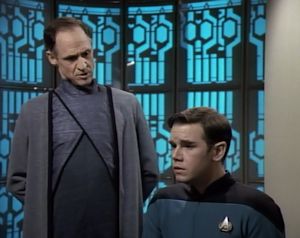| |||||||||||
| |||||||||||
|
Spoiler-free notes: When J'Dan, the Klingon spy, tries to bribe Worf into helping him escape, he must believe that Worf's father is guilty of selling secrets to the Romulans and that, as such, Worf would be sympathetic. His dialogue to Worf has several layers of meaning to it. Nice reference to "Conspiracy." TNG has come a long way since "The Neutral Zone," as it is now willing to acknowledge that the events of that earlier episode had repercussions. This episode goes on to recall "The Best of Both Worlds" and "Data's Day," in addition to its reminding us of the events of "Sins of the Father." Episodes like this help to flesh out the overall mythology of the show and allow it to grow and change over time, something the original series didn't do very much until the movies. Admiral Satie reminds me just a little of Dolores Umbridge. It seems weird that a Klingon would resort to daily injections to treat a medical condition. Perhaps that's why J'Dan's in an engineering exchange program and not a full-fledged Klingon warrior. Actually, now that I think about it, it makes his character really interesting, because it might figure into the reasons he was willing to betray the Empire's alliance with the Federation. It could also help explain his confessional outburst in which he accuses the Empire of becoming "a bunch of mewling babies." As a Klingon, he is seen as weak for having a medical condition, and so he projects his feelings of inadequacy onto his entire species and has a vulnerability that can be exploited by the Romulans. Man, either I'm reading way too much into a convenient plot device, or the writers are more thorough than I give them credit for. Every time I watch this episode, I feel really bad for poor Simon Tarses. I guess that's pretty much the point. The conversation between Satie and Picard about the weight of Betazoid intuition is a good way to further explore the ethics of using an empath. I like stuff like that, because it can only really exist in a sci-fi or fantasy universe and stretches the imagination into practical ways of looking at fanciful ideas. This story uses it as a springboard to discussing concrete, relatable, and prescient real world issues, and that, in my opinion, is what Star Trek--and speculative fiction in general, for that matter--is all about. Satie compares Tarses to a cockroach, "scurrying around in dark corners." This should be especially ominous to anyone familiar with the history of genocide. Ah yes, the Seventh Guarantee. Totally different from the Fifth Amendment. "The road from legitimate suspicion to rampant paranoia is very mich shorter than we think." There are some great lines in this one. Picard and Worf's debate about the necessity of security weighed against the necessity of freedom is a very old argument that resonates with American audiences. Whether you're talking about WWII incarceration of Japanese-Americans, 1950's McCarthyism, or post-9/11 detainments, conversations nearly identical to Picard and Worf's are a centerpiece of American political friction. Pundits on television are still having the debate, every single day, and every American should have, by now, heard some variation of the famous Benjamin Franklin quote, "They who can give up essential liberty to obtain a little temporary safety, deserve neither liberty nor safety." Maybe Admiral Henry only walked out because he had to take a leak. This is one of my absolute favorite episodes, not just of TNG, but of Star Trek in general (though I somehow neglected it in my Top 20 episodes list, an enormously regrettable oversight on my part). TNG tried to do an episode like this in the first season, with the perfectly respectable "Coming of Age," but the quality of the show--both in the writing and in the characters--wasn't refined enough at the time to succeed as well as this one does. "The Drumhead" is a story I think about often, and one that has the power to put complex political ideas into a simple, easy-to-understand context. It is incredibly poignant, and the climactic scene in which Satie and Picard face off at the hearing is one of the most brilliantly written and acted scenes in the show's entire run. I've even been known to bust out Judge Aaron Satie's quote, "With the first link, the chain is forged. The first speech censured, the first thought forbidden, the first freedom denied, chains us all irrevocably," during political debates with others. The method J'Dan uses to transmit information in the bloodstream of another is similar to how the Klingons smuggle information in ENT's pilot episode, "Broken Bow." | |||||||||||
|
| |||||||||||
| |||||||||||
|
Copyright ©2012 e. magill. All rights reserved.
|

